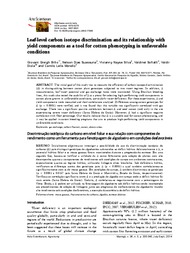Leaf-level carbon isotope discrimination and its relationship with yield components as a tool for cotton phenotyping in unfavorable conditions.
Leaf-level carbon isotope discrimination and its relationship with yield components as a tool for cotton phenotyping in unfavorable conditions.
Author(s): BRITO, G. G. de; SUASSUNA, N. D.; SILVA, V. N.; SOFIATTI, V.; DIOLA, V.; MORELLO, C. de L.
Summary: The initial goal of this study was to measure the efficiency of carbon isotope discrimination (?) in distinguishing between cotton plant genotypes subjected to two water regimes. In addition, ? measurements, leaf water potential and gas exchange ratios were monitored. Using Brazilian breeding lines, this study also tested the usability of ? as a proxy for selecting high-performing yield components in cotton plants grown in unfavorable conditions, particularly water deficiency. For these experiments, ? and yield components were measured and their correlations analyzed. Differences among cotton genotypes for ? (p < 0.0001) were verified, and it was found that this variable was significantly correlated with gas exchange. There was a significant positive correlation between ? and seed cotton yield only in the site experiencing severe water deficiency (Santa Helena de Goiás). However, ? had a significant negative correlation with fiber percentage. Our results indicate that ? is a suitable tool for cotton phenotyping, and it may be applied in cotton breeding programs that aim to produce high-performing yield components in unfavorable conditions.
Publication year: 2014
Types of publication: Journal article
Keywords: Estresse abiótico, Fracionamento do carbono, Troca gasosa
Observation
Some of Embrapa's publications are published as ePub files. To read them, use or download one of the following free software options to your computer or mobile device. Android: Google Play Books; IOS: iBooks; Windows and Linux: Calibre.
Access other publications
Access the Agricultural Research Database (BDPA) to consult Embrapa's full library collection and records.
Visit Embrapa Bookstore to purchase books and other publications sold by Embrapa.

